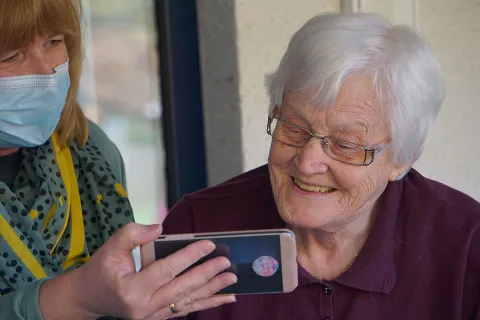Older adults with cancer need coordinated and specialized health services

This article was originally published on UBC School of Nursing.
Older adults with cancer face significant challenges in accessing and navigating health care in B.C. due to limited language skills, financial capacity and health conditions, as well as systemic discrimination related to age, ethnicity or language.
That’s the key finding from a new project led by UBC nursing assistant professor Dr. Kristen Haase (she/her), in collaboration with BC Cancer Agency medical oncologist Dr. Caroline Mariano and UBC nursing PhD trainee and BC Cancer nurse practitioner Bonnie Leung.
In this Q&A, Dr. Haase talks about these challenges and laid out a potential path forward for health care providers, educators and researchers.
What inspired you to put this study together?
When older adults are diagnosed with cancer, they commonly already have other illness that they are managing. This makes treating their cancer more complicated. It also makes navigating the health system more complicated because there are more practitioners involved. Our health and social support systems should be ready to assist older adults when they are diagnosed with cancer, but unfortunately, this is not often the case.
The American Society of Clinical Oncology – the leading body for cancer treatment globally – recommends specialized services that can assess older adults’ health and function. This information helps older adults and their caregivers get a full picture of how cancer treatment will affect them so that they can make informed choices about treatment. However, such services do not yet exist in B.C.
We want to change this. We spent the last year holding discussion groups and interviews across the province to understand what is working really well, and what can be improved. We talked to health care providers in cancer, primary care and geriatrics. And we also talked to older adults who had been diagnosed with cancer, their caregivers, and those working for community groups serving seniors and immigrant seniors.
What findings stood out for you?
People reported positive supports, such as volunteer drivers who take people to their medical checkups, and person-centered accessible services. A nurse in Prince George told us how an iPad gave her the opportunity to support someone’s end of life journey in a remote community on Dolphin Island without them having to leave the community.
While there can be bright spots along the cancer journey for seniors, there are also real health system challenges that we need to address.
While some seniors are very fit, climbing mountains or running marathons into their 80s or 90s, others might experience dementia and trouble completing their daily activities alone. Some may live at home, others in nursing homes. A growing number of older adults have immigrated to Canada and may not speak English or be familiar with the health care system. In addition, seniors may also experience challenges due to red tape, or age-, ethnicity- or language-related discrimination.
What are your next steps?
Our work revealed urgent priorities for both health care and research – such as paying more attention to older adults who are immigrants or do not speak English, giving thoughtful consideration to financial circumstances, and forming partnerships between primary care, geriatrics and cancer care services.
Now we hope the broader community in B.C. will comment on these priorities through a survey and community meetings. Completing this survey means we are one step closer to enhancing care for the thousands of older adults with cancer in BC who are diagnosed each year.
Ultimately, our goal is to work with community members and health system leaders to develop specialized geriatric oncology services and supports that prioritize the distinct needs of older adults with cancer and their caregivers.


